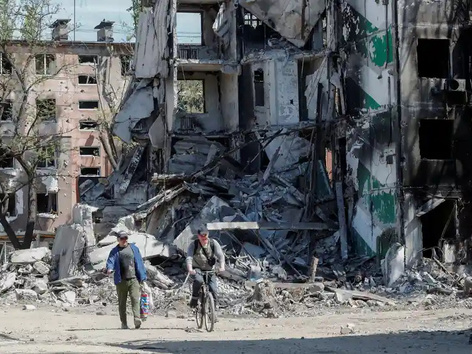
Due to mass spontaneous burials, unsanitary conditions and lack of access to drinking water, there is a risk of developing infectious diseases, including cholera, in occupied Mariupol. This was announced at a conference by Chief Sanitary Officer Igor Kuzin.
During the three months of siege and occupation, Mariupol residents buried the dead in inappropriate places. Many bodies of people remain unburied. Also during occupation household garbage isn't taken out of city streets. And due to the fighting, the water supply and drainage systems were damaged.
"We are not saying that we are 100 percent waiting for outbreaks of certain dangerous diseases. However, the situation with unsanitary conditions and disruptions in water supply, sewerage, operation of water treatment facilities - all this can lead to the spread of acute infectious, especially intestinal infections, "- said Ihor Kuzin.
He also noted that in the past cases of cholera have been recorded in Mariupol, the last time was in 2011, so there is a possibility of recurrence of the disease. The spread of infectious diseases, according to the chief nurse, is also facilitated by warm weather and lack of access to medical care.
The WHO is also concerned about the possible spread of cholera in Mariupol. Anti-cholera drugs are already being prepared there.
In addition, Petro Andryushchenko, an adviser to the mayor of occupied Mariupol, said that Russia was closing out the city due to the possible spread of infections. And in Rostov-on-Don, they are preparing infectious diseases wards for potential patients among the Russian military.
"The word 'cholera' really sounds not only in the WHO but also inside the city, from the occupation authorities and their curators. Therefore, the city is closing, and it is very sad for us, because of all the possible scenarios, in our opinion, in the fight against the epidemic, Russia has chosen the most cynical one. Just close the people in the city, leave everything as it is, whoever survives will survive, ”Andryushchenko said.
The Public Health Center of Ukraine says that without proper treatment, cholera can be fatal. But with successful treatment, the disease ends in complete recovery.
Cholera is an acute diarrheal infection that is transmitted from person to person when contaminated food or water enters the body.
To prevent cholera, the PHC recommends following the rules of hygiene: carefully heat all food and water, use disinfectant tablets for water if available, if you can not wash vegetables and fruits with clean water - also heat them, and do not eat food if there are doubts about their origin and storage conditions.
Recommended articles
1 min
For refugees
2 min
War



